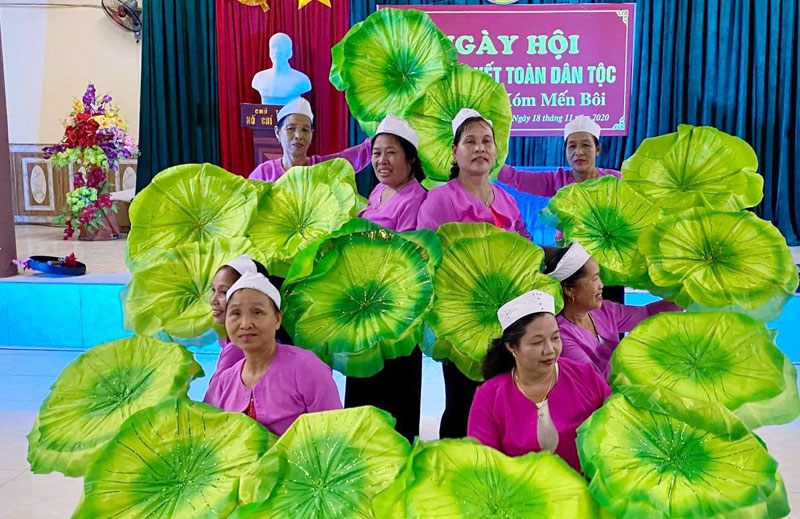
(HBO) - The cultural and performance activities have not only been exciting in typical residential areas such as Bai, Men Boi, but they have also been spreading widely in other villages, from Tro, Go Che, Muon, Mo to Lo, Lap, Chieng . Nine out of the nine hamlets have all established and maintained the activities of entertaining teams with about 12 to 15 members for each team.

The performance team
of the elderly people in Me Boi hamlet, Kim Lap commune (Kim Boi) are
performing the dance "The Stroke of the countryside” on the Muong folk music in
the Festival of the Great National Unity.
Mr. Bui Van
Tin, the Vice Chairman of the Communal People's Committee says that after
merging, in the commune there are 9 hamlets with 2,003 households, and Muong
ethnic people account for 98%. Over the past time, with the attention of the
Party Committee and the authorities, the cultural, entertaining and sports
movements among the people have been promoted. In addition to the resolution on
the economic development, the communal Party Committee issued the resolution,
and the communal People’s Committee has a plan to promote the cultural and
entertaining movement associated with preserving the identity of the Muong
ethnic group.
On the
occasions of festivals, New Year, celebrations and important days of the year,
the commune has been maintaining the exchanging activities, the public
performances to attract and arouse the movement. Every year, there is a
mechanism to support part of the budget to encourage the helmets’ performance
teams to participate in practice. In addition, in the contests and festivals,
the locality also has gifts to promptly encourage, praise and reward the
performance teams.
From the
cultural movement and mass culture, the commune has selected the core cultural
nuclei to participate in contests and performances at the district’s level. At
the same time, through the lyrics, the dances and the performances of Muong
gongs with its own unique features, the conservation and preservation of the
cultural identity among the people has been promoted, and it has been more and
more popular and spreading. Thereby, it has been contributing to encouraging
the spirit of enthusiastic production labor, building a new countryside,
building a cultural life in the residential area. In 2020, the average income
per capita of the commune is estimated at 26 million VND. Through the review,
80% of households have met the standards of the cultural family.
With an increasingly vibrant and widespread emulation movement aimed at building cultured residential areas and cultured families, Yen Thuy District has been making steady progress toward improving both the material and spiritual well-being of its people, while fostering a civilized, prosperous, beautiful, and progressive community.
Once lacking recreational spaces and community facilities, Residential Group 2 in Quynh Lam Ward (Hoa Binh City) has recently received attention for the construction of a new, spacious, and fully equipped cultural house. The project followed the model of state support combined with public contributions in both labor and funding.
The "All people unite to build cultural life" movement, which has been effectively integrated with Kim Boi district’s socio-economic development goals, is fostering a lively spirit of emulation across local residential areas, hamlets, villages, public agencies, and enterprises. In addition, through the initiative, traditional cultural values are being preserved and promoted, while community solidarity and mutual support in poverty reduction and economic development are being strengthened.
A working delegation of the Hoa Binh provincial People’s Committee led by its Permanent Vice Chairman Nguyen Van Toan on June 11 inspected the progress of a project to build the Mo Muong Cultural Heritage Conservation Space linked to tourism services in Hop Phong commune, Cao Phong district.
Born and growing in the heroic land of Muong Dong, Dinh Thi Kieu Dung, a resident in Bo town of Kim Boi district, in her childhood was nurtured by the sweet lullabies of her grandmother and mother. These melodies deeply imprinted on her soul, becoming an inseparable part of her love for her ethnic group's culture. For over 20 years, this love for her hometown has driven Dung to research, collect, and pass down the cultural values of the Muong people to future generations.
In the final days of May, the Ethnic Art Troupe of Hoa Binh Province organized performances to serve the people in remote, mountainous, and particularly disadvantaged areas within the province. These were not just ordinary artistic shows, but they were the meaningful journeys aimed at spreading cultural values, enhancing the spiritual life of the people and contributing to the preservation of ethnic minority cultural identities.



